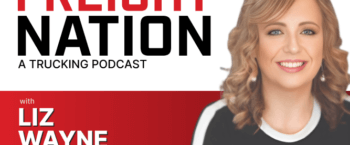7 Risk Management Tips for Freight Brokers

Vetting Carriers is Easier
With Risk Factors
Start a FREE 14-day trial.
Without freight risk management, you’re potentially exposing your brokerage to fraud which can result in substantial financial and reputational damage. While checking every carrier’s credentials and verifying that they have the proper insurance is time-consuming, without a proper vetting process, you risk liability exposure that could damage your ability to make a living as a broker.
We’ve outlined the top risks for freight and share some risk management strategies freight brokers can implement.
What are the top freight risks for brokers?
Whether you’re looking to move freight locally or cross-country, there are several risks to be aware of:
Lack of carrier availability
Labor disputes, high demand, and even a spike in fuel prices can make it difficult to find a carrier to move freight. When that happens, freight brokers may risk missing a delivery window and violating the terms of their shipping company contract.
Theft
Unfortunately, cargo theft is an ongoing problem. Thieves have become increasingly sophisticated in their methods, sometimes hooking up a stolen cab to a trailer and stealing an entire load. They may also engage in “smash-and-grab” theft, prying open trailer doors to grab what they can quickly.
Fraud
Fraud is a costly problem throughout the transportation industry, and for freight brokers, it often arises in the form of scammers masquerading as legitimate carriers. These criminals may fraudulently use a carrier’s credentials, or obtain multiple MC numbers to establish transportation companies, then disappear with loads freight carriers have hired them to move.
Carrier negligence
The effects of carrier negligence can range from a late delivery to a total loss of cargo. Negligent carriers often have a spotty record, with red flags like lapsed authority, license suspensions, or customer complaints.
Unexpected events
Natural disasters, traffic jams, and carrier equipment failure are just some of the unexpected events that can interfere with freight delivery.
7 risk management strategies for freight brokers
Putting some processes in place can help strengthen your transportation risk management.
Plan for capacity shortages
A supply chain disruption or capacity shortage can restrict your ability to make money. If you don’t have enough carrier capacity, you have to turn down business. Brokers who maintain relationships with carriers and quickly source new carriers can mitigate capacity shortages and disruptions.
The issues surrounding driver and carrier capacity shortages are complex, so brokers need to develop a trusted driver network and nurture those relationships. It’s also essential to provide top-notch service to shippers so you can keep your drivers on the road and making money.
A quality load board can help you stay competitive, even when you have more freight than your current network of carriers can haul.
Onboard quality carriers
There’s more to choosing carriers than simply getting someone to drive a load of cargo from point A to point B. Your carriers need the proper types and amount of insurance in place. They must also maintain up-to-date credentials and have a reputation for being honest and trustworthy.
For your own reputation, and to minimize compliance risks, it’s critical to work with carriers who proactively maintain the necessary certifications and licenses to remain qualified to haul. Vetting current and new carriers is an extremely time-consuming process that eats into your ability to source new loads and match them to carriers.
But with tools like RMIS Carrier Onboarding from Truckstop, you can onboard carriers up to 80% faster.
Check carrier insurance certificates
Brokers must be certain their carriers are insured. Your carriers’ credentials are constantly changing, which makes it necessary to not only vet new carriers to make sure they have the right insurance in place, but also to monitor current carriers and communicate about lapses in coverage.
The Truckstop Carrier Onboarding system is fully automated, allowing brokers to stay on top of changes in their carriers’ insurance while ensuring that new carriers are 100% in compliance with each insurance regulation.
Carry excess coverage
There may be occasions when cargo insurance doesn’t fully cover a freight broker’s losses. For example, if a carrier crashes and loses an entire load, a freight broker’s insurance might cover the lost cargo, but if a liability claim arises from that crash, cargo insurance might be insufficient to cover damages. Carrying excess coverage is a good way to cover both freight losses and any associated damages.
A freight broker’s contingency cargo policy also allows brokers to provide shippers with an additional layer of protection. The insurance goes into effect if the carrier fails to cover the loss due to loss or damage exclusions, a lapse in coverage, or refusal to cover the damages.
Ask about carrier equipment
Minimize the risks of truck breakdown and product damage by asking about the condition of a driver’s vehicle and equipment. This is especially important if the freight you’re moving requires refrigeration, or a flatbed trailer with tie-downs.
Monitor carrier compliance
The Federal Motor Carrier Safety Administration (FMCSA) uses its Compliance Safety and Accountability (CSA) program to provide a universal standard for drivers and carriers. Higher compliance scores translate to better reputations for carriers.
When you can quickly and easily access a carrier’s CSA score, you can get a snapshot of their past behavior and decide whether they’re a good fit for your brokerage.
While carriers are financially responsible for damage due to negligence, you have to monitor carrier compliance to protect your business from legal liability as the broker. Our Carrier Monitoring product will help you find information about carriers quickly.
Sign freight contracts
Freight contracts include the rates and terms of every movement you make as a broker. It’s crucial to keep your contacts up to date and be vigilant about getting the proper signatures (including yours) every time.
Improve risk management with the right technology partner
As a broker, your number one priority is to facilitate safe transport between carriers and shippers at a fair rate of pay for all parties, including yourself. With the right tools, you can spend less time on manual risk management and more time building the relationships that power your business.
Truckstop is designed to meet the day-to-day needs of every freight broker. Efficiently vet new carriers while monitoring your current drivers with the compliance tools to automate your business. Get a demo today.
Topics:

Find out how our platform gives you the visibility you need to get more done.
Get helpful content delivered to your inbox.
Schedule a demo.
Find out how our platform gives you the visibility you need to get more done.





